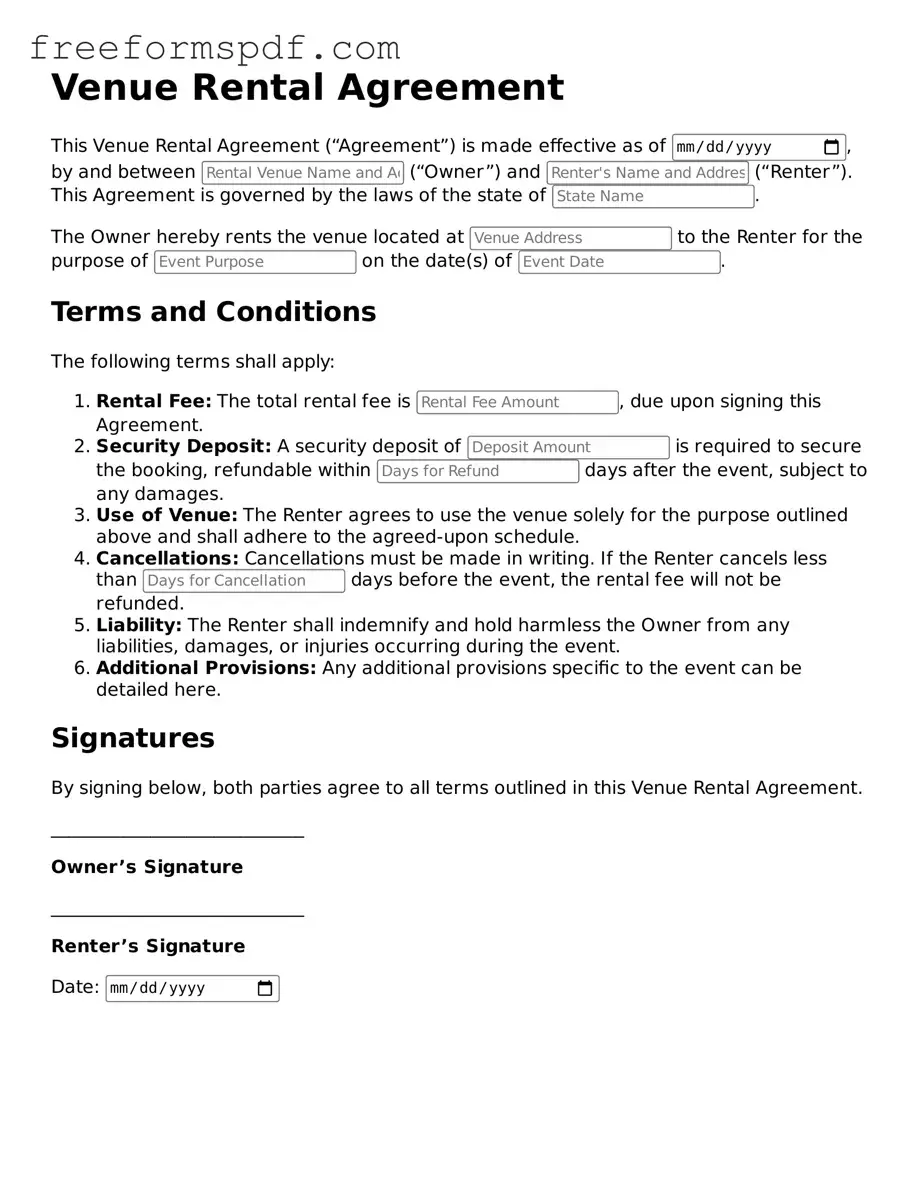Venue Rental Agreement Document
Common mistakes
-
Incomplete Information: Many people forget to fill out all required fields. Leaving sections blank can lead to delays or misunderstandings.
-
Incorrect Dates: Double-check the event date and time. Mistakes here can result in double bookings or unavailability of the venue.
-
Failure to Read Terms: Skimming over the terms and conditions can lead to surprises later. Understanding cancellation policies and fees is crucial.
-
Not Specifying Setup Needs: If you have specific requirements for setup, such as seating arrangements or equipment, make sure to detail them. Otherwise, you might not get what you expect.
-
Ignoring Insurance Requirements: Some venues require proof of insurance. Failing to provide this can result in losing your reservation.
Learn More on This Form
-
What is a Venue Rental Agreement?
A Venue Rental Agreement is a legal document that outlines the terms and conditions under which a venue is rented for a specific event. This agreement protects both the venue owner and the renter by clearly defining responsibilities, payment terms, and any restrictions or requirements related to the use of the venue.
-
What should be included in a Venue Rental Agreement?
Key components of a Venue Rental Agreement typically include:
- The names and contact information of both the venue owner and the renter.
- The date and time of the event.
- The rental fee and payment schedule.
- Details about the venue, including its capacity and available amenities.
- Any rules or restrictions, such as noise limitations or alcohol policies.
- Cancellation and refund policies.
- Liability and insurance requirements.
-
How do I fill out a Venue Rental Agreement?
To fill out a Venue Rental Agreement, start by gathering all necessary information. Ensure you have the venue's details, the event specifics, and both parties' contact information. Carefully read through the agreement to understand each section. Fill in the required information accurately, and be sure to review any terms that may need negotiation. Both parties should sign and date the document to make it legally binding.
-
What happens if I need to cancel my event?
If you need to cancel your event, refer to the cancellation policy outlined in the Venue Rental Agreement. Many agreements include specific terms regarding notice periods and potential penalties. Depending on the timing of your cancellation, you may be entitled to a full or partial refund of your deposit or rental fee. Communicating with the venue owner as soon as possible is crucial, as it may help in negotiating a more favorable outcome.
Misconceptions
When it comes to Venue Rental Agreements, there are several misconceptions that can lead to confusion. Understanding these common misunderstandings can help you navigate the rental process more smoothly. Below is a list of ten prevalent misconceptions:
- All Venue Rental Agreements are the same. Many people believe that all rental agreements have a standard format. In reality, each venue may have its own unique terms and conditions.
- Signing the agreement means I can use the venue anytime. Some assume that signing the agreement grants them unrestricted access. However, the agreement typically specifies the rental time and any limitations.
- Deposits are non-refundable. While some venues may have non-refundable deposits, others may offer a refund under certain conditions. Always read the terms carefully.
- Insurance is optional. Many people think that insurance is not necessary. In fact, some venues require liability insurance to protect against potential damages or accidents.
- There are no penalties for canceling. Some individuals believe they can cancel without consequences. Most agreements include cancellation policies that outline potential fees.
- All fees are included in the initial quote. It is a common misconception that the quoted price covers everything. Additional fees for cleaning, security, or overtime may apply.
- I can make changes to the agreement after signing. Many assume they can modify the terms at any time. Changes typically require mutual consent and may need to be documented in writing.
- My guests can park anywhere. Some believe that parking is unrestricted. However, venues often have designated parking areas and specific rules regarding parking.
- Food and beverage restrictions are negotiable. Many think they can bring in outside catering or beverages. However, venues often have exclusive agreements with specific vendors.
- The agreement is only for the event date. Some individuals think the agreement only covers the event itself. In truth, it may also include setup and breakdown times, which are crucial for planning.
Understanding these misconceptions can empower you to approach your venue rental with greater clarity and confidence. Always take the time to read and understand your agreement fully before signing.
Other Types of Venue Rental Agreement Forms:
Storage Rental Agreement Template Free - The agreement includes payment details and due dates.
The Arizona Lease Agreement form is crucial for understanding the rental landscape, and a comprehensive overview of the Lease Agreement process can be invaluable for both landlords and tenants navigating their responsibilities.
